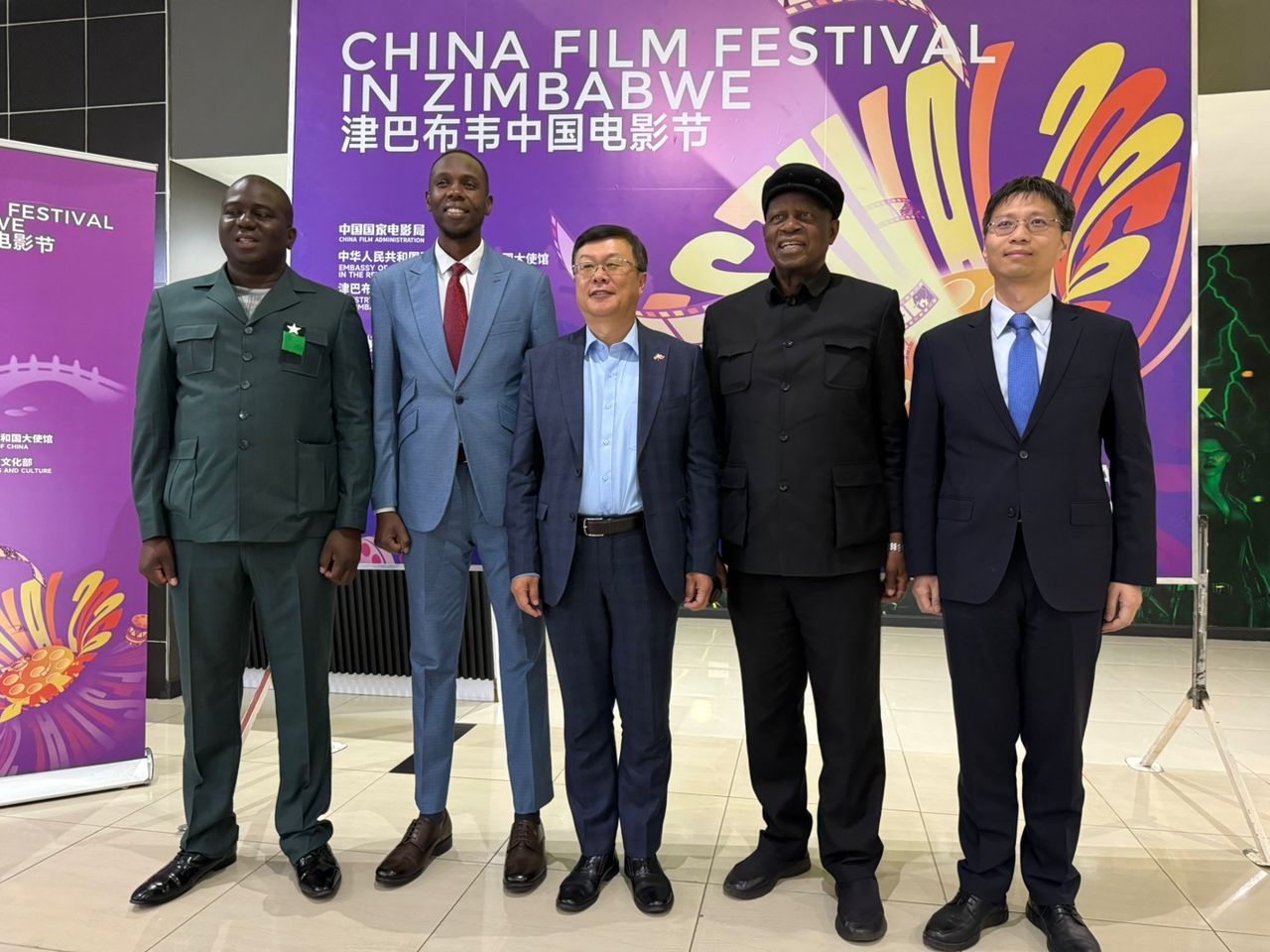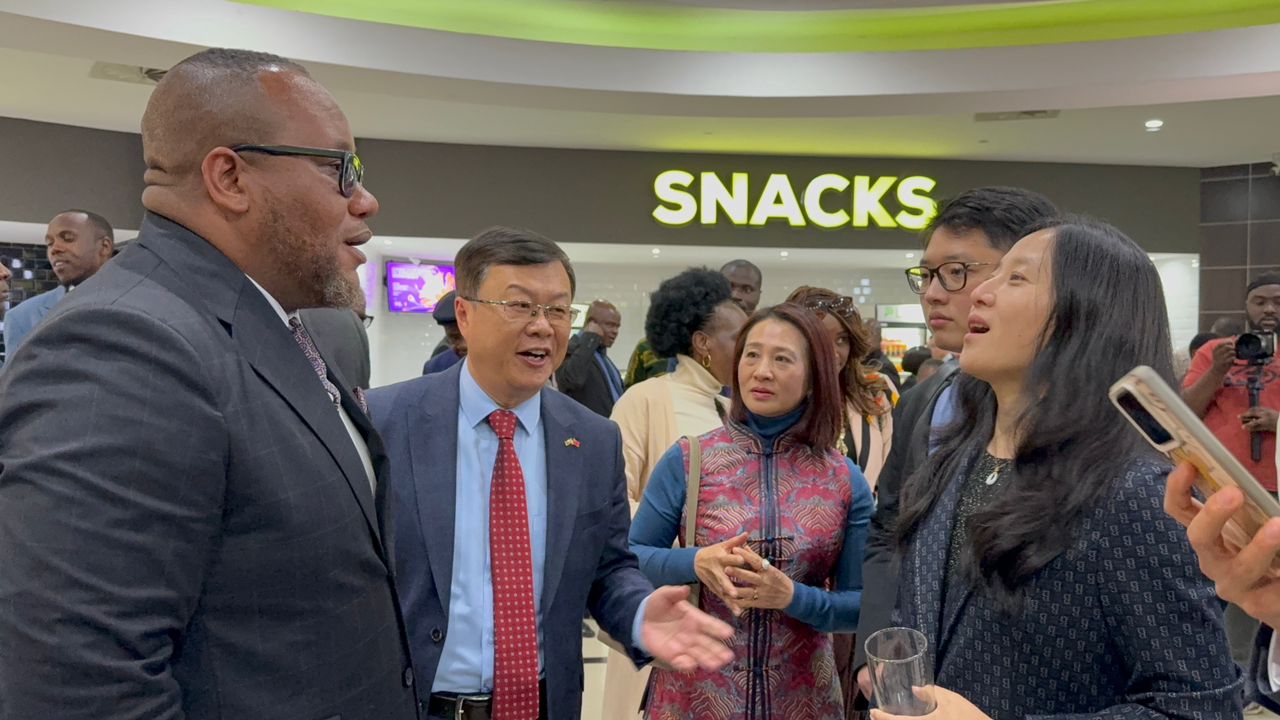Current Affairs
Zimbabwe and China Collaborate on Cultural Film Project to Deepen Bilateral Ties

Zimbabwe and China have announced a collaborative film project designed to showcase the learning and cultural exchange between the two nations.
By Abel Karowangoro
The announcement was made during the official launch of the 2025 Chinese Film Festival in Harare.
His Excellency Zhou Ding, Ambassador of the People’s Republic of China to Zimbabwe, revealed that both nations are working together to co-produce a film that highlights the experience of Zimbabwean youth exploring China—its traditions, heritage, modern development, and people.
“We look forward to Zimbabwean audiences exploring China following the footsteps of films, experiencing the magnificent landscapes and rich cultural heritage of China,” said Ambassador Zhou.
“Ladies and gentlemen, China-Africa friendship transcends time and space, surmounting mountains and oceans, and has been passed down through generations.
Bound by films, we will build bridges that connect hearts and minds. Together we will compose a new chapter in building a community with a shared future for mankind.”
The initiative, supported by the Chinese Embassy and Zimbabwe’s Ministry of Youth, Sport, Arts and Recreation, is part of broader cultural cooperation efforts aimed at promoting people-to-people exchanges and deepening mutual understanding between the two countries.
Hon. Deputy Minister of Youth, Sport, Arts and Recreation, Emily Jesaya, applauded China for its unwavering commitment to fostering cultural ties through creative platforms such as film.
“This project is a celebration of friendship and mutual respect.

Through storytelling and cultural exchange, our youth will gain new perspectives and greater appreciation for global diversity. I am especially grateful to China for opening these doors of opportunity for Zimbabwean creatives and learners,” Jesaya said.
The upcoming film will feature Zimbabwean students, artists, and filmmakers engaging with various facets of Chinese society, from traditional arts to cutting-edge technology and historical landmarks.
The production aims to strengthen cultural literacy and inspire curiosity about China among Zimbabwean audiences.
Richard Tontone, founder of the Cinema Society of Zimbabwe, expressed enthusiasm for the initiative and praised its long-term benefits for the local film industry.
“This is a golden opportunity for Zimbabwean filmmakers to collaborate internationally and learn new techniques while telling meaningful stories. The partnership will not only elevate local talent but also broaden the global reach of Zimbabwean cinema,” said Tontone.

“The Chinese Film Festival has already begun to energize our creative community and inspire young filmmakers.”
The Chinese Film Festival, which will run for one week across major cities in Zimbabwe, features a curated selection of films showcasing China’s cinematic excellence, culture, and values. Events will include panel discussions, film screenings, and workshops focused on strengthening bilateral film industry partnerships.

Luo Yang, Deputy Director General of China Film Administration said the festival and film project are key steps in cementing the cultural foundations of China-Zimbabwe relations. As both countries look to the future, cinema is being recognized as a powerful medium to foster unity, mutual respect, and shared development.
“I wish the Chinese Film Festival a big success,” Yang echoing the spirit of cooperation and shared vision between the two nations.
Current Affairs
Minister Rwodzi Charts Path as Sector Takes Lead in GDP Growth

Itai Mazire
Tourism and Hospitality Industry Minister Barbara Rwodzi has implored players in the sector to embrace innovation, sustainability, and stronger partnerships to safeguard Zimbabwe’s tourism gains, as the industry now leads national GDP growth ahead of mining and agriculture.
In a speech delivered on her behalf by Tourism Permanent Secretary Dr. Takaruza Munyanyiwa at the Hospitality Association of Zimbabwe (HAZ) Summit and Annual General Meeting in Harare today, Minister Rwodzi said the country stood at a “historic crossroads” following its recent listing by Forbes as the best destination to visit in 2025.
“This is a well-deserved accolade which we should celebrate and sustain going forward. Congratulations, makorokoto, amhlope to the service providers of the tourism and hospitality industry of Zimbabwe.”
The Minister applauded the sector’s resilience in the face of pandemics, economic headwinds, and climate-related shocks, noting that the spirit of Zimbabwean hospitality remains unbroken.
“We have continued to smile, to serve, and to tell our authentic story, hence reaping the rewards now,” she said.
Giving an update on performance, Minister Rwodzi reported that international tourist arrivals grew by 9 percent between January and September 2025 compared to the same period last year, with strong traffic from the Americas, Africa, and Asia.
Domestic travel also surged by 20.9 percent over the same period, while the sector generated approximately USD 922 million in 2025 a 10 percent rise from the USD 839 million recorded last year.
“These are encouraging signs that our recovery is gaining positive traction. But future-proofing requires more than recovery it demands transformation,” she said.
Minister Rwodzi outlined five pillars she said would anchor the transformation of the sector: digitalisation; sustainable and climate-resilient tourism; human capital development; infrastructure and connectivity; and stronger branding and market diversification.
“The future of hospitality is digital,” she said. “We must move from brochures to big data, from paper-based booking to smart platforms.”
She urged operators to embrace online booking systems, virtual reality tourism aids, and other digital tools that enhance visitor experiences.
On sustainability, Minister Rwodzi said protecting Zimbabwe’s natural and cultural heritage was “not an expense it is an investment in the longevity of our industry.”
The Minister stressed the need to invest in human capital, calling on operators to work closely with academia to bridge skills gaps and develop tomorrow’s hospitality innovators. She highlighted the First Lady, Dr. Auxillia Mnangagwa’s gastronomy vision as a key avenue for elevating Zimbabwe’s culinary offerings.
On infrastructural development across the country, she said it remained central to competitiveness: “A tourist’s journey begins long before they reach our front desk — it begins on a road, a runway, or a mobile network.”
Minister Rwodzi reiterated that Government is committed to creating an enabling environment, pointing to the recent reduction of tourism fees by up to 50 percent to lower operating costs.
“Future-proofing cannot be achieved by Government alone,” she said. “The private sector is the engine of creativity, investment, and service excellence.”
Her call for collaboration was anchored on an African proverb which states that, “Tomorrow belongs to the people who prepare for it today.”
The Minister said the role of HAZ remained critical as Zimbabwe eyes increased international tourist inflows.
“The world’s eyes are turning towards Zimbabwe. We have the assets, we have the people, we have the passion so why not?” she said.
“To HAZ, your role has never been more critical. You are the unified voice of the hospitality industry. Your strength lies in your collective action.”
She said the ongoing summit provided a platform to “strategise, innovate, and build consensus” as the sector pushes towards Vision 2030.
“The potential is vast. The time is now. Let us build not just an industry, but a legacy,” said Minister Rwodzi.
Current Affairs
Apostolic Church Founder Paul Mwazha Dies at 107

Zimbabwe and the wider African Christian community are mourning the loss of Bishop Paul Mwazha, the revered founder of the Apostolic Church in Africa, who passed away today at the remarkable age of 107.
Bishop Mwazha, widely regarded as one of the continent’s most influential religious leaders, dedicated his life to the growth and spiritual guidance of his church, which boasts millions of followers across Zimbabwe and beyond. His teachings, rooted in faith, discipline, and community service, have left an enduring legacy that continues to shape generations.
The Apostolic Church in Africa under his leadership became a cornerstone of spiritual life in many communities, providing not only religious guidance but also social support and education initiatives. Church leaders have called for prayers as they prepare for national and regional mourning rituals.
Further details on funeral arrangements and memorial services are expected to be released in the coming days.
Business
Zimbabwe Bets Big on Biotech to Fuel Industrial Revolution


Dr. Eng. Willie Ganda
By Enia Dube
The Minister of Higher and Tertiary Education, Innovation, Science and Technology Development, Hon. Dr Fredrick Shava, has thrown his weight behind biotechnology as a key driver of the country’s industrialisation and modernisation agenda.
Speaking at the National Biotechnology Authority (NBA) Strategic Planning Workshop in Kadoma, Dr Shava urged the Authority to identify biotechnology-led opportunities that can boost national production and accelerate economic growth.
“Biotechnology serves as a key catalyst for NDS2 implementation, advancing inclusive economic growth, job creation, and sustainable industrial development,” Dr Shava said, emphasising the need to integrate biotechnology into national value chains to unlock a biotechnology-driven economy. He added that this would turn innovation into industry, knowledge into enterprise, and science into jobs.
The NBA has made notable progress in establishing a strong regulatory framework, promoting biotechnology research and commercialisation, and raising public awareness about the sector’s potential. The Authority has successfully commercialised products such as Mapfura wine and Cofsol cough syrup, and has several other biotechnology products in the pipeline.
Incoming NBA Board Chairperson, Professor Idah Sithole-Niang, echoed Dr Shava’s sentiments, emphasising that the Authority’s five-year strategic plan must meaningfully contribute to the attainment of Vision 2030. “This event marks a significant milestone in the Authority’s ongoing efforts to enhance the role of biotechnology in Zimbabwe’s socio-economic development,” she said.
The workshop aimed to realign priorities and resources in response to emerging technologies and global biotechnology trends, and develop a strategic roadmap to strengthen biotechnology as a key driver of Zimbabwe’s socio-economic transformation. The rapidly evolving global biotechnology landscape, including advancements in gene editing, bio-manufacturing, and climate-smart innovations, presents both new opportunities and challenges for Zimbabwe.
“We recognise the pressing need for an inclusive and forward-looking strategic plan that can navigate the complexities of the biotechnology landscape,” Professor Sithole-Niang noted. The workshop was attended by researchers, government officials, and NBA staff, who are optimistic about the potential of biotechnology to drive Zimbabwe’s economic transformation and achieve Vision 2030.
-

 Current Affairs1 week ago
Current Affairs1 week agoOperation restore order
-

 Crime and Courts2 months ago
Crime and Courts2 months agoMasasi High School Abuse Scandal Sparks Public Outcry
-

 Crime and Courts2 months ago
Crime and Courts2 months agoKuwadzana Man Jailed for Reckless Driving and Driving Without a Licence
-

 Current Affairs3 months ago
Current Affairs3 months agoMunhumutapa Day: Zimbabwe’s Newest Public Holiday Set for Annual Observance
-

 Current Affairs4 months ago
Current Affairs4 months agoBreaking: ZIMSEC June 2025 Exam Results Now Available Online
-

 Current Affairs1 month ago
Current Affairs1 month agoBREAKING NEWS: ZANU PF Director General Ezekiel Zabanyana Fired
-

 Current Affairs3 months ago
Current Affairs3 months agoGovernment Bans Tinted Car Windows in Nationwide Crime Crackdown
-

 Current Affairs2 months ago
Current Affairs2 months agoExposed: Harare GynecologistChirume Accused of Negligence, Extortion, and Abuse















